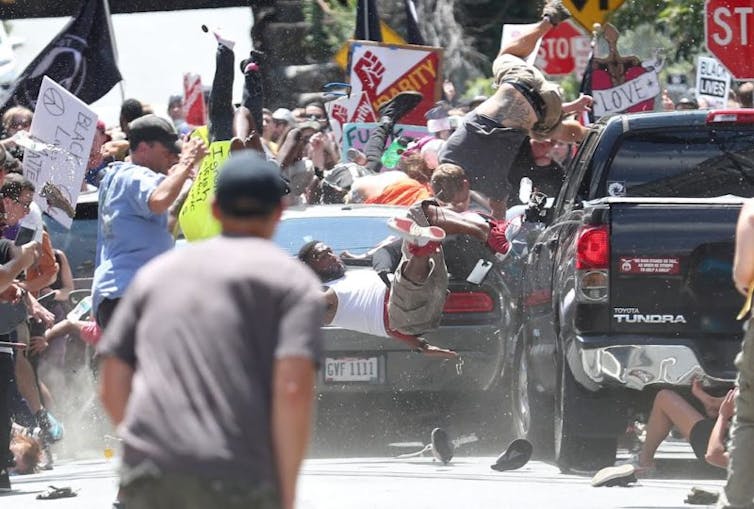By John W. Whitehead
“Those who would give up essential Liberty, to purchase a little temporary Safety, deserve neither Liberty nor Safety.”—Benjamin Franklin
The ease with which Americans are prepared to welcome boots on the ground, regional lockdowns, routine invasions of their privacy, and the dismantling of every constitutional right intended to serve as a bulwark against government abuses is beyond unnerving.
I am referring at this particular moment in time to President
Trump’s decision to deploy military forces to the border in a supposed bid to protect the country from invading bands of illegal immigrants.
 |
| John W. Whitehead |
This latest attempt to bamboozle the citizenry into relinquishing even more of their rights is commonly referred to as letting the wolves guard the henhouse.
Never mind that using the U.S. military as a police force constitutes a direct violation of the Posse Comitatus Act of 1878. Never mind that America’s police have already been transformed into a standing army. Never mind that the borders have always been porous—a fact that the government and its corporate partners profit from greatly when convenient. Never mind that Trump’s infatuation with heavy-handed military and police power could pave the way for far greater threats to our liberties than a few underfed, unemployed migrants entering the country.
We are long past the stage where the government—at any level—abides by restrictions on its powers.
What we are dealing with is a run-away government hyped up on its own power, whose policies are dictated more by paranoia than need.
Watching the state of our nation unravel, I can’t help but think of Nazi Field Marshal Hermann Goering’s remarks during the Nuremberg trials. As Goering
noted:
It is always a simple matter to drag people along whether it is a democracy, or a fascist dictatorship, or a parliament, or a communist dictatorship. Voice or no voice, the people can always be brought to the bidding of the leaders. This is easy. All you have to do is tell them they are being attacked, and denounce the pacifists for lack of patriotism and exposing the country to danger. It works the same in every country.
It works the same in every country.
The same propaganda and police state tactics that worked for Adolf Hitler 80 years ago continue to be employed with great success in a post-9/11 America.
We keeping returning to the same sticking point, forced to make the same choice over and over again: essential liberty or temporary safety.
Time and again, we keep sacrificing our liberties for phantom promises of safety.
Whatever the threat to so-called security—whether it’s rumored weapons of mass destruction, school shootings, or alleged acts of terrorism—it doesn’t take much for the American people to march in lockstep with the government’s dictates, even if it means submitting to martial law, having their homes searched, and being stripped of one’s constitutional rights at a moment’s notice.
Moreover, it doesn’t really matter whether it’s a Democrat or a Republican at the helm, because the bureaucratic mindset on both sides of the aisle now seems to embody the same philosophy of authoritarian government.
The lesson is this: once a free people allows the government to make inroads into their freedoms or uses those same freedoms as bargaining chips for security, it quickly becomes a slippery slope to outright tyranny.
This is fast becoming a government that has no respect for the freedom or lives of its citizenry.
Yet there are warning signs we cannot afford to ignore.
First off, there is no such thing as a “border” in the eyes of these military patrols. The entire United States of America has become a Constitution-free zone.
According to journalist Todd Miller, the “once thin borderline of the American past” is “an ever-thickening band,
now extending 100 miles inland around the United States—along the 2,000-mile southern border, the 4,000-mile northern border and both coasts... This ‘border’ region now covers places where two-thirds of the US population (197.4 million people) live… The ‘border’ has by now devoured the full states of Maine and Florida and much of Michigan.”
As part of its so-called efforts to keep the nation safe from a host of threats, the U.S. government has declared that ever-expanding border region a Constitution-free zone.
Miller explains:
“In these vast domains, Homeland Security authorities can institute roving patrols with broad, extra-constitutional powers backed by national security, immigration enforcement and drug interdiction mandates. There, the Border Patrol can set up traffic checkpoints and fly surveillance drones overhead with high-powered cameras and radar that can track your movements. Within twenty-five miles of the international boundary, CBP agents can enter a person’s private property without a warrant.”
To recap:
66% of Americans (2/3 of the U.S. population, 197.4 million people) now live within this 100-mile-deep, Constitution-free zone.
That’s a lot of ground to declare off limits to the Constitution.
The result, as Miller notes, “is a permanent, low-intensity state of exception that makes the expanding borderlands
a ripe place to experiment with tearing apart the Constitution, a place where not just undocumented border-crossers, but millions of borderland residents have become the targets of continual surveillance.”
Be warned:
government agents continue to roam further afield of the so-called border as part of their so-called crackdown on illegal immigration, drugs and trafficking. Consequently, greater numbers of Americans are being subject to warrantless searches, ID checkpoints, transportation checks, and even surveillance on private property.
Second, this de facto standing army that has been imposed on the American people is in clear violation of the spirit—if not the letter of the law—of the Posse Comitatus Act, which restricts the government’s ability to use the U.S. military as a police force.
America’s police forces—which look like, dress like, and act like the military—have undeniably become a “standing” or permanent army, one composed of full-time professional soldiers who do not disband, which is exactly what the Founders feared. With the police increasingly posing as pseudo-military forces—complete with weapons, uniforms, assault vehicles, etc.—a good case could be made for the fact that SWAT team raids, which break down the barrier between public and private property, have done away with this critical safeguard.
Unfortunately, the increasing militarization of the police, the use of sophisticated weaponry against Americans and the government's increasing tendency to employ military personnel domestically have all but eviscerated historic prohibitions such as the Posse Comitatus Act.
Indeed, there are a growing number of exceptions to which Posse Comitatus does not apply.
These exceptions serve to further acclimate the nation to the sight and sounds of military personnel on American soil and the imposition of martial law.
This begs the question: if the borders constitute a Constitution-free zone, who will police those policing our borders and hold them accountable for misconduct and wrongdoing?
We’ve seen what happens to domestic police charged with wrongdoing: they get little more than a slap on the wrist. Just recently, in fact, the U.S. Supreme Court shielded a police officer who shot a woman four times in her driveway as she stood talking to a friend while holding a kitchen knife. As Justice Sonia Sotomayor acknowledged in her dissent in
Kisela v. Hughes, “It tells officers that they can shoot first and think later, and it tells the public that
palpably unreasonable conduct will go unpunished.”
Third, there’s the Customs and Border Protection (CBP) agency, an arm of the Department of Homeland Security made up of more than 60,000 Customs and Border Protection employees, and supplemented by the National Guard and the U.S. military.
A national police force imbued with all the brutality, ineptitude and corruption such a role implies, the DHS—aptly described as a “
wasteful, growing, fear-mongering beast”—has been ruthlessly efficient when it comes to establishing what the Founders feared most: a standing army on American soil.
The
third largest federal agency behind the Departments of Veterans Affairs and Defense, the DHS—with its 240,000 full-time workers, $40 billion budget and sub-agencies that include the Coast Guard, Customs and Border Protection, Secret Service, Transportation Security Administration (TSA) and the Federal Emergency Management Agency (FEMA)—extends its tentacles into every aspect of American life.
In fact, just about every nefarious deed, tactic or thuggish policy advanced by the government today can be traced back to the DHS, its police state mindset, and the
billions of dollars it distributes to police agencies in the form of grants to transform them into extensions of the military: militarizing police, incentivizing SWAT teams, spying on protesters, stockpiling ammunition, distributing license plate readers to police agencies, contracting to build detention camps, tracking cell-phones with Stingray devices, carrying out military drills and lockdowns in American cities, using the TSA to carry out soft target checkpoints, directing government workers to spy on Americans, conducting widespread spying networks using fusion centers, utilizing drones and other spybots, funding city-wide surveillance cameras, and carrying out Constitution-free border control searches.
Finally, there’s this whole question of martial law.
Technically, a good case can be made that the Constitution-free border regions within the United States are already under martial law carried out by a
standing army comprised of militarized police and the U.S. military.
Then again, for all intents and perhaps, the American police state is already governed by martial law, is it not? Battlefield tactics. Militarized police. Riot and camouflage gear. Armored vehicles. Mass arrests. Pepper spray. Tear gas. Batons. Strip searches. Drones. Less-than-lethal weapons unleashed with deadly force. Rubber bullets. Water cannons. Concussion grenades. Intimidation tactics. Brute force. Laws conveniently discarded when it suits the government’s purpose.
This is what martial law looks like, when a government disregards constitutional freedoms and imposes its will through military force, only this is martial law without any government body having to declare it. This is martial law packaged as law and order and sold to the public as necessary for keeping the peace.
It doesn’t matter whether the so-called threats to national security posed by terrorists, extremists or immigrant armies ever became a reality. Once the government acquires—and uses—additional powers, it does not voluntarily relinquish them.
The damage has been done.
For those who can read the writing on the wall, it’s all starting to make sense: the military drills carried out in major American cities, the VIPR inspections at train depots and bus stations, the SWAT team raids on unsuspecting homeowners, the Black Hawk helicopters patrolling American skies, the massive ammunition purchases by various federal agencies such as the Department of Homeland Security, the Department of Education, the IRS and the Social Security Administration.
Viewed in conjunction with the government’s increasing use of involuntary commitment laws to declare individuals mentally ill and lock them up in psychiatric wards for extended periods of time, the NDAA’s provision allowing the military to arrest and indefinitely detain anyone, including American citizens, only codifies this unraveling of our constitutional framework.
Throw in the profit-driven corporate incentive to jail Americans in private prisons, as well as the criminalizing of such relatively innocent activities as holding Bible studies in one’s home or sharing unpasteurized goat cheese with members of one’s community, and it becomes clear that “we the people” are the real enemies of the state.
We’re the ones in the government’s crosshairs.
That wall being built at the border won’t be just for keeping illegal immigrants out—it’s to keep us trapped within the punishing confines of the American police state.
Our freedoms—willingly relinquished in response to endless scare tactics—have been breached, undermined, and eroded time and time again. We’re being conditioned to this life in a police state.
As for this latest maneuver, it’s just another means of poking a hole in the already-tattered fabric of the Constitution.
In other words, it’s a test to see how hard we will fight to hold onto what remains of our freedoms.
If this is a test, we’re failing abysmally.
Face it: we are sliding fast down a slippery slope to a Constitution-free America.
We’ve been heading in this direction for some time now, but this downward trajectory has picked up speed since Donald Trump became president.
This state of near-lockdown has been helped along by government policies and court rulings that have made it
easier for the police to shoot unarmed citizens, for law enforcement agencies to
seize cash and other valuable private property under the guise of asset forfeiture, for military weapons and tactics to be deployed on American soil, for government agencies to carry out round-the-clock surveillance, for profit-driven private prisons to lock up greater numbers of Americans, for homes to be raided and searched under the pretext of national security, for American citizens to be labeled terrorists and stripped of their rights merely on the say-so of a government bureaucrat, and for pre-crime tactics to be adopted nationwide that strip Americans of the right to be assumed innocent until proven guilty and creates a suspect society in which we are all guilty until proven otherwise.
All of these assaults on the constitutional framework of the nation have been sold to the public as necessary for national security.
Time and again, the public has fallen for the ploy hook, line and sinker.
We’re being reeled in, folks, and you know what happens when we get to the end of that line? We’ll be cleaned, gutted and strung up.
Incredibly, no matter how many times Americans are lied to, cheated, swindled, robbed, manipulated, and doublecrossed, they still keep falling for the government’s tired, thinly disguised ploys to amass more power at the expense of the citizenry.
Remember when George W. Bush claimed the country was being invaded by terrorists post-9/11 and insisted the only way to keep America safe was to
give the government and its gun-toting agents greater powers to spy, search, detain and arrest?
The terrorist invasion never really happened, but the government kept its newly acquired police powers made possible by the USA Patriot Act.
Remember when Barack Obama claimed the country was being invaded by domestic terrorists and insisted the only way to keep America safe was to
give the military the power to strip Americans of their constitutional rights, label them extremists, and detain them indefinitely without trial?


The invasion never really happened, but the government kept its newly acquired detention powers made possible by the National Defense Authorization Act (NDAA).
Now you have Donald Trump claiming the country is being invaded by immigrants and insisting that the only way to keep America safe is to
empower the military to “assist” with border control.
Mind you,
Trump is not the first president to deploy military forces to the border.
Nevertheless, you can rest assured that this latest call for boots on the ground (
whether those boots belong to the National Guard or the armed forces is mere semantics) to police the American border is yet another Trojan Horse that will inflict all manner of nasty police state surprises on an unsuspecting populace.
As I make clear in my book
Battlefield America: The War on the American People, the menace of a national police force—a.k.a. a standing army—vested with the power to completely disregard the Constitution, cannot be overstated, nor can its danger be ignored.
ABOUT JOHN W. WHITEHEAD
Constitutional attorney and author John W. Whitehead is founder and president of
The Rutherford Institute. His new book
Battlefield America: The War on the American People (SelectBooks, 2015) is available online at www.amazon.com. Whitehead can be contacted at
johnw@rutherford.org.
Reprinted by permission of The Rutherford Institute.












